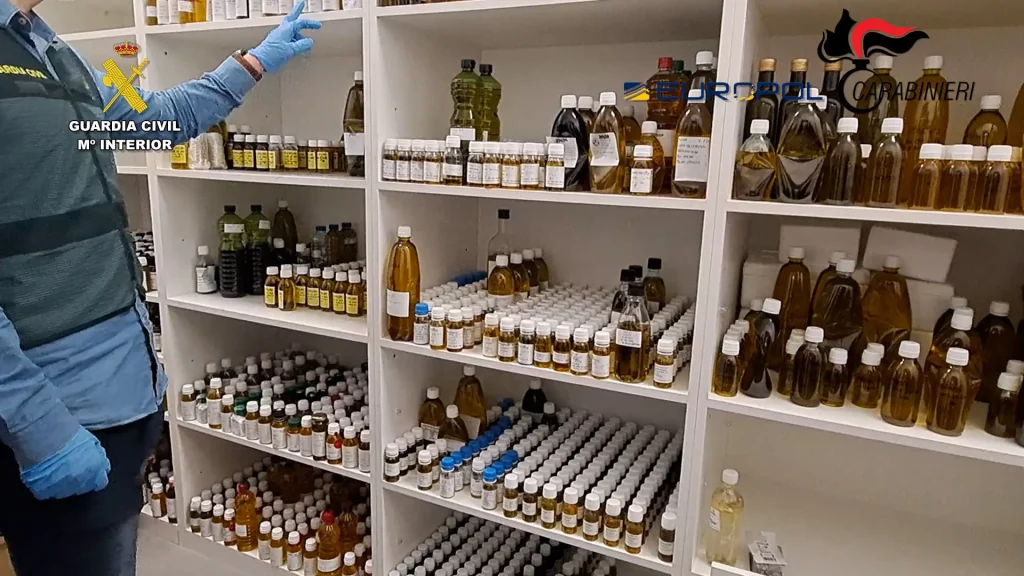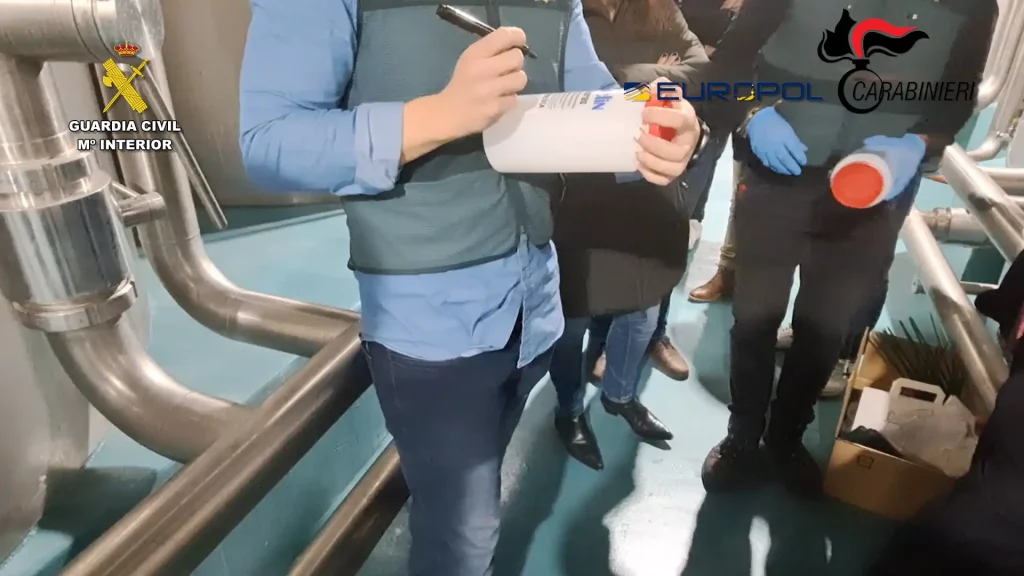04/12/23
Detenidas once personas por distribuir internacionalmente aceite de oliva adulterado
Se han inmovilizado 16 depósitos de aceite y más de 5.200 litros de aceite de oliva adulterado preparado para su venta e intervenidos más de 91.000 euros en efectivo
La organización operaba en España e Italia con dos ramas que realizaban cambios en la categoría de aceites turbios a lampantes para convertirlos en virgen y virgen extra mediante falsificación de la documentación para poder comercializarlos
Se han realizado ocho registros entre ambos países, cinco de ellos en España en envasadoras y almacenes de Ciudad Real, Jaén y Córdoba
Operación en colaboración con Carabinieri y Europol
Detenidas once personas por distribuir internacionalmente aceite de oliva adulterado
La Guardia Civil ha detenido a once personas que formaban una organización con dos ramas en España e Italia dedicadas a la distribución internacional de aceite de oliva adulterado. La operación ha sido realizada de manera coordinada con Carabinieri y Europol con el registro entre ambos países de ocho registros en cooperativas de las provincias de Ciudad Real, Jaén y Córdoba.
El Seprona de la Guardia Civil realizó la inspección de un camión que transportaba aceite de oliva en Manzanares (Ciudad Real) donde detectó una serie de anomalías. A raíz de este caso, la Unidad Orgánica de Policía Judicial inició la operación “Omegabad. Los agentes comprobaron la existencia de una organización con dos ramas, una española y otra italiana, dedicados a distribuir aceite de oliva adulterado a nivel internacional.
En España utilizaban una empresa vinculada con el proceso de adquisición de aceites de menor categoría para realizar cambios en la categoría de aceites turbios a lampantes para convertirlos en virgen y virgen extra mediante falsificaciones de la documentación para poder comercializarlos. Mezclaban los aceites turbios, un subproducto del oliva, con el aceite de oliva de mejor calidad para conseguir unos parámetros adecuados de grasas y eritrodiol que permitieran su comercio. También impedían la trazabilidad del producto mediante el no registro de los aceites de oliva de su empresa.
En Italia, dos empresas aglutinaban aceites de gran parte de los países que tienen relevancia en el panorama oleícola, entrando la mayoría en la Unión Europea a través de Portugal y realizando con ellos los mismos procedimientos de falsificación y manipulación que en España. Además, utilizaban una fuerte estructura empresarial trasnacional mediante mercantiles en los principales países productores de aceite sin controles de trazabilidad como el español que facilitaba la labor de adulteración.
Durante la investigación se ha contado con la colaboración del Arma de Carabinieri italiana y Europol, que también han participado en las inspecciones.
Se han realizado ocho registros en España e Italia de forma simultánea donde han sido detenidas once personas. Cinco de las inspecciones han sido realizadas en envasadoras y almacenes de aceite de las provincias de Ciudad Real, Jaén y Córdoba.
Entre todos los registros se han inmovilizado 16 depósitos de aceite y más de 5.200 litros de aceite de oliva adulterado listo para su venta al público. Han sido intervenidos más de 91.000 euros en efectivo, cuatro vehículos de alta gama y bloqueado varias cuentas bancarias.
Para más información pueden contactar con la oficina de prensa de la Guardia Civil en Ciudad Real en el teléfono 926.22.11.80 extensión 0220104.
Imágenes de la noticia


68,000 Gallons of ‘Unfit’ Olive Oil Seized by Italy and Spain
Officials in Europe, where a majority of the world’s olive oil is produced, charged 11 people with selling adulterated oil not suitable for consumption.
Plastic bottles with different shades of yellow and green oils sit on shelves with labels. A few glass bottles are in the background.
The olive oil fraud operation in Spain and Italy was part of a European effort to crack down on false labels on foods.Credit…Guardia Civil
Dec. 4, 2023
Law enforcement agencies in Spain and Italy have arrested 11 people who ran a “food fraud operation” that produced more than 260,000 liters, or roughly 68,000 gallons, of olive oil that was sold as high-quality but in reality was “unfit for consumption,” officials said on Monday.
Officers from the Spanish Civil Guard and the Italian Carabinieri raided several locations last month in both countries, including sites in the Italian regions of Sicily and Tuscany, and uncovered barrels of oil that contained lampante oil, the lowest grade of olive oil, considered to be of terrible quality because of its high level of acidity and its unpleasant flavor and smell.
Officers also seized 91,000 euros, or roughly $98,000, and billing documents that belonged to the 11 people arrested, officials said.
The Spanish and Italian authorities, who did not immediately respond to requests for comment on Monday, did not name the 11 people who had been arrested or list specific charges.
The arrests have shed light on an underworld of fraudulent food sellers in Europe who for years have capitalized on foodies who seek luxurious olive oil, particularly from Italy and Spain, where local products are known for their slightly fruity and nutty fragrance and their vibrant green and butter-yellow hues that drip onto the plates of countless dishes, from backcountry villas to fine-dining restaurants around the globe.
Since 2013, European officials have tried to crack down on fraudulent labeling on a host of foods by organizing joint investigations with a number of law enforcement agencies and imposing tougher fines. Those fake labels have at times created a confusing marketplace in Europe, involving products including meat that was labeled beef but was actually cheap horse meat and an expensive spice that was called saffron but was really adulterated saffron mixed with cheaper materials.
But for years, olive oil has remained one of the most mislabeled food items on the continent, according to the European Commission’s 2022 report on food safety.
In 2019, olive oil became the product with the most requests for investigation, followed by fish and meat products, the report said.
About 15 percent of suspicious products reported to the European Commission’s system for food fraud came from Spain last year. Of those reports, most concerned squid products or mislabeled olive oil, the report said.
“Unfortunately, the faking of extra virgin olive oil is a common practice, which is why the fight against it is a law enforcement priority — especially in production countries,” Europol, the European Union agency for law enforcement cooperation, said in a statement.
The Italian authorities have been particularly busy in recent years cracking down on mislabeled olive oil. The Olive Oil Times, a publication that covers the olive oil industry, reported that Italian officials prevented 2.3 million liters, or roughly 607,595 gallons, of virgin and refined olive oils labeled as extra virgin from being sold last year.
Photos and videos of the investigation that were posted by Europol on social media hinted at a vast and detailed operation: towering silver barrels, safes filled with thick wads of cash, rows of computers, and containers filled to the brim with a thick, yellow-brown substance that investigators poured into small labeled bottles.
The 11 people charged diluted their olive oil product with lampante oil, officials said, allowing them to offer competitive prices as they entered legal supply chains.
“This illegal practice can not only cause a public health risk, but also undermine consumer trust and thus have further economic repercussions,” Europol said.
In Ciudad Real, Spain, officials seized a dozen barrels of adulterated oil — meaning extra virgin olive oil that was mixed with other oils — as well as four vehicles and billing documents. In Sicily and Tuscany, three oil factories were believed to have been involved in the illegal operation, officials said.
The investigation also comes as the global demand for olive oil remains high, with several forces, such as technology and climate change, transforming and challenging the industry.
Millions of consumers around the world regularly pay for extra virgin olive oil that is adulterated with inferior olive oil, mixed with cheaper oils like sunflower or canola, or colored with chlorophyll or beta carotene.
Still, adulteration is not prevalent everywhere. The North American Olive Oil Association, a trade association, said that “the biggest fraud in olive oil today is the stories leading consumers to believe it’s all ‘fake,’” citing studies showing that many samples of olive oil from U.S. retailers had been tested and found to be authentic.
A peer-reviewed study by the Food and Drug Administration published in 2015 found a low rate of adulteration — less than 5 percent — in 88 products sold in U.S. retail stores.
“So, go ahead and buy with confidence that you’re getting the real deal,” the North American Olive Oil Association said.
11 arrests, as police seize 260,000 litres of unconsumable ‘extra virgin oil’
5th December 2023
Spain’s Guardia Civil, working in conjunction with the Italian Carabinieri and Europol, have made 11 arrests and sized over 260,000 litres of olive oil that is ‘unfit for consumption’ – the three police agencies said in a statement.
In a coordinated action during November, the Spanish and Italian law enforcement officials conducted searches in various locations. Around Ciudad Real in Spain, 11 suspects were detained and 12 barrels containing 260,000 litres of ‘adulterated oil’ were seized, the statement said. The officers also seized four vehicles and €91,000 in cash, as well as digital and physical evidence such as billing documents and e-mails.
In the Italian regions of Sicily and Tuscany, investigators inspected three oil factories suspected to be involved in the illegal practices. Several fiscal documents and clients lists were acquired, oil samples gathered, and one company was sanctioned for irregular labelling of its products. Europol deployed a specialist with a mobile office to Spain, allowing for quick cross-matches against Europol databases.
In the food fraud operation, investigators uncovered that the criminals used so-called ‘lampante oil’, the lower-quality variant of olive oil, to dilute their product. Lampante olive oil is characterised by ‘elevated acidity levels, an undesirable flavour, and a distinctly unpleasant odour, which make it unsuitable for consumption’, the police said. The term ‘lampante’ itself originates from its historical use as a fuel in oil lamps.
A mix of various factors, such as the general inflation of prices, reduced olive oil production and increasing demand, have created the perfect breeding ground for fraudulent producers.
Mixing consumer-grade olive oil with lower grade alternatives allowed the criminals to offer competitive prices while entering legal supply chains, the police said. This illegal practice can not only cause a public health risk, but also undermine consumer trust and thus have further economic repercussions, the statement concluded.
Guardia Civil
#OperacionesGC 
Desarticulada una organización que operaba en #España e #Italia dedicada a la distribución internacional de #AceiteDeOliva adulterado.


发表回复